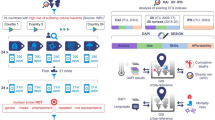Abstract
Pandemic is known for primary major disaster in the human life. It is not only affecting the health, but also its consequences leading to the decline of countries socio-economic status for longer period of time. Though the countries have developed better health systems to prevent the pandemic, it is highly necessary to handle and manage the situation without major loss to health and wealth during the period. Computational intelligence technologies can help the citizen and the government in effectively managing the pandemic situations. There are many actors involved in this Disaster Risk Management (DRM) cycle for better coordination and service. This research study focuses on the different mobile applications in need for this emergent timing. The requirements for each of these applications are narrated with future challenges and implementation directions.
Access this chapter
Tax calculation will be finalised at checkout
Purchases are for personal use only
Similar content being viewed by others
References
S Gupta, For mobile devices, think apps, not ads. Harvard Bus. Rev. 91(3), March 2013
F. Shih, et al. Democratizing mobile app development for disaster management. In: Joint proceedings of the workshop on AI problems and approaches for intelligent environments and workshop on semantic cities (2013)
L. I. Besaleva, A. C. Weaver, Applications of social networks and crowdsourcing for disaster management improvement, in 2013 International Conference on Social Computing. IEEE, (2013)
C. Martin-Shields, The Technologist’s Dilemma: Ethical Challenges of Using Crowdsourcing Technology in Conflict and Disaster-Affected Regions. Geo. J. Int’l Aff. 14, 157 (2013)
C. Hagar, Crisis informatics In: Encyclopedia of Information Science and Technology, 3rd edn. ed by M. Koshrow‐Pour. Hershey. (2015), pp. 1350–1359
M. L. Tan, et al. Mobile applications in crisis informatics literature: a systematic review. Int. J. Disaster Risk Reduction 24, 297–311 (2017)
M. Poblet, E. García-Cuesta, P. Casanovas, Crowdsourcing roles, methods and tools for data-intensive disaster management. Inf. Syst. Front. 20(6), 1363–1379 (2018)
V. Sukhwani, R. Shaw, Operationalizing crowdsourcing through mobile applications for disaster management in India. Progress Disaster Sci. 5, (2020)
R. I. Ogie, et al. Crowdsourced social media data for disaster management: lessons from the PetaJakarta. org project. Comput. Environ. Urban Syst. 73, 108–117 ((2019))
A. V. Arunraj, et al., An IoT application in disaster management using real-time thermal imaging system, in AIP Conference Proceedings, vol. 2222. No. 1. (AIP Publishing LLC, 2020)
A. Adeel, et al., A survey on the role of wireless sensor networks and IoT in disaster management, in Geological disaster monitoring based on sensor networks. (Springer, Singapore, 2019), pp. 57–66
K. Ali, et al., Internet of things (IoT) considerations, requirements, and architectures for disaster management system, in Performability in internet of things. (Springer, Cham, 2019), pp. 111–125
S. A. Shah, et al. The rising role of big data analytics and IoT in disaster management: recent advances, taxonomy and prospects. IEEE Access 7, 54595–54614 (2019)
A. Sinha, et al. Impact of internet of things (IoT) in disaster management: a task-technology fit perspective. Ann. Oper. Res. 283(1–2), 759–794 (2019)
N. Chaudhuri, I. Bose Application of image analytics for dis-aster response in smart cities, in Proceedings of the 52nd Hawaii International Conference on System Sciences (2019)
W. Sun, P. Bocchini, B. D. Davison, Applications of artificial intelligence for disaster management. Natural Hazards (2020), 1–59
N. Oliver, et al., Mobile phone data for informing public health actions across the COVID-19 pandemic life cycle (2020): eabc0764
D. A. Drew, et al. Rapid implementation of mobile technology for real-time epidemiology of COVID-19. Science (2020)
N. Oliver, et al., Mobile phone data and COVID-19: Missing an opportunity?. arXiv preprint arXiv:2003.12347 (2020)
G. Basilaia, D. Kvavadze, Transition to online education in schools during a SARS-CoV-2 coronavirus (COVID-19) pandemic in Geor-gia. Pedagogical Res. 5(4), 1–9 (2020)
I. A. M. S. Widiastuti, I. B. N. Mantra, H. Sukoco, Mobile internet-based learning to cultivate students’speaking skill during coronavirus pandemic. Int. J. Appl. Sci. Sustainable Dev. (IJASSD) 2(1), 6–10 (2020)
K. J. Danjuma, et al., Mobile application for Ebola virus disease diagnosis (EbolaDiag), in Censorship, Surveillance, and Privacy: Concepts, Methodologies, Tools, and Applications. (IGI Global, 2019), pp. 419–432
J.H. Wright, R. Caudill, Remote treatment delivery in response to the COVID-19 pandemic. Psychother. Psychosom. 89(3), 1 (2020)
A. Yan, Z. Yi, D. A. Mirchandani. How hospitals in main-land China responded to the outbreak of COVID-19 using IT-enabled ser-vices: an analysis of hospital news webpages. Journal of the American Medical Informatics Association (2020)
M. Ienca, E. Vayena, On the responsible use of digital data to tackle the COVID-19 pandemic. Nature Med. 26(4), 463–464 (2020)
P. A. McCullough, et al. Urgent need for individual mobile phone and institutional reporting of at home, hospitalized, and intensive care unit cases of SARS-CoV-2 (COVID-19) infection. Rev. Cardiovascular Med. 21(1), 1–7 (2020)
K. Ganasegeran, S. A. Abdulrahman, Artificial intelligence applications in tracking health behaviors during disease epidemics, in Human Behaviour Analysis Using Intelligent Systems. (Springer, Cham), 2020, pp. 141–155
M. Z. Iqbal, Md F. I. Faiz, Active surveillance for COVID-19 through artificial intelligence using real-time speech-recognition mobile application, in 2020 IEEE International Conference on Consumer Electronics-Taiwan (ICCE-Taiwan). IEEE (2020)
K. A. Wittbold, et al. iPad deployment for virtual evaluation in the emergency department during the COVID-19 pandemic. The American Journal of Emergency Medicine (2020)
M. Javaid, et al. Industry 4.0 technologies and their applications in fighting COVID-19 pandemic. Diabetes & Metabolic Syndrome: Clinical Research & Reviews (2020)
https://www.health-house.be/en/corona/mit-technology-review-covid-tracing-tracker/ Accessed on November 25, 2020
Author information
Authors and Affiliations
Corresponding author
Editor information
Editors and Affiliations
Rights and permissions
Copyright information
© 2022 The Author(s), under exclusive license to Springer Nature Switzerland AG
About this chapter
Cite this chapter
Saravanan, K., Ramesh, K., Hema, V.S.V., Viganesh, S. (2022). An Exploratory Study of Disaster Risk Management Mobile Applications in Pandemic Periods. In: Nayak, J., Naik, B., Abraham, A. (eds) Understanding COVID-19: The Role of Computational Intelligence. Studies in Computational Intelligence, vol 963. Springer, Cham. https://doi.org/10.1007/978-3-030-74761-9_9
Download citation
DOI: https://doi.org/10.1007/978-3-030-74761-9_9
Published:
Publisher Name: Springer, Cham
Print ISBN: 978-3-030-74760-2
Online ISBN: 978-3-030-74761-9
eBook Packages: Intelligent Technologies and RoboticsIntelligent Technologies and Robotics (R0)




